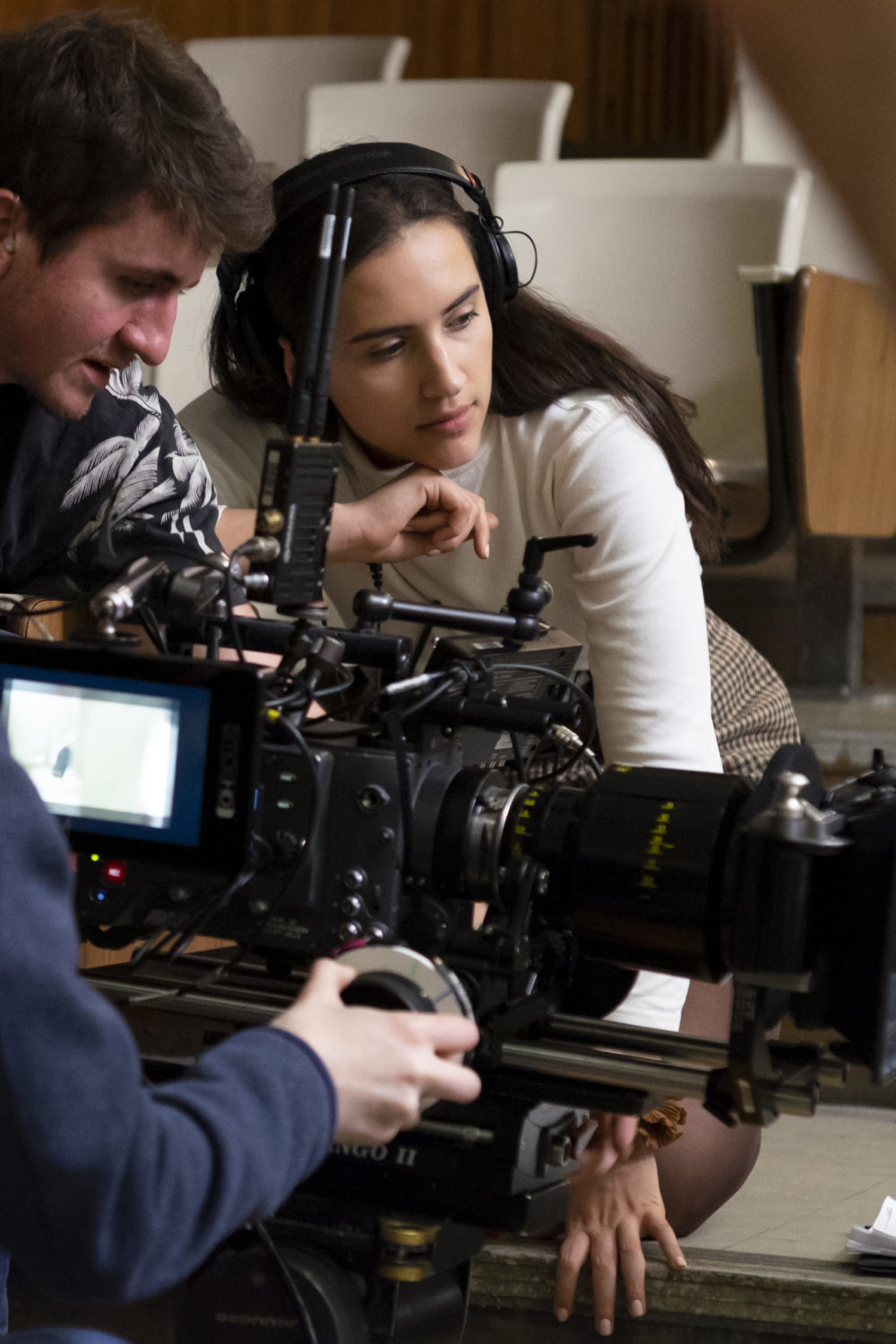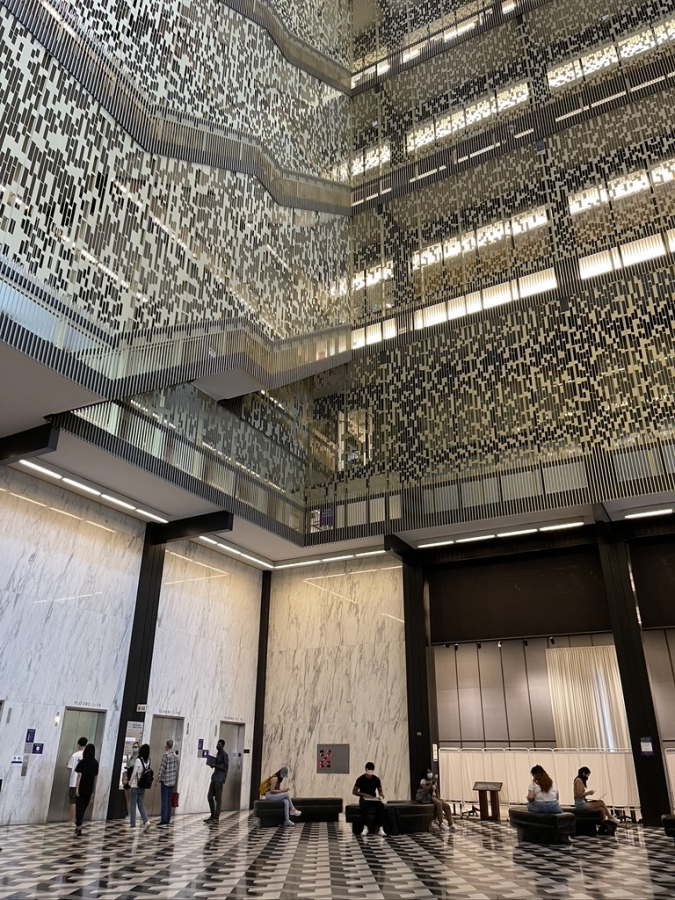We’re getting closer to December, so you know what that means, it’s almost winter bre…I mean finals season! This period of time is often filled with anxiety, from short nights of sleep to cramming seven chapters for your final exam. So here’s some advice from NYU upper-level students about getting through this tough period. We’ve all done it, so you can too!

Sabrina, Steinhardt School of Culture, Education, and Human Development
Sabrina is braving her junior year! These are the tips and tricks she wish she knew when she started preparing for her first finals:
- If you plan on studying with other people, make sure to study with those you know you can be productive with.
- Work–life balance is still important during exam season. So promise yourself to stop studying at a certain time! For example, tell yourself, “After 11:30 p.m., I’ll close my laptop and detox, sleep, or watch TV.”
- Use Google Calendar or another calendar app to allocate time and prioritize your hardest to easiest assignments.
- Eat!!!
Amber, College of Arts and Science
This is Amber’s last NYU finals season (so she clearly knows what she’s doing). Here are her best tips for studying for finals:
- Talk to your professors and teaching assistants; don’t be scared of using their office hours.
- If there’s a study guide, actually use it.
- This one might be a little too late, but a good heads-up for next semester: studying is so much easier if you take good notes and pay attention during the entire semester.
- If you feel frustrated about your performance or that something didn’t go as well as you planned, try to reset mentally. Resetting can help because a new and fresh mindset can positively affect the rest of your finals work. You can always bounce back from one bad exam; don’t let that affect the rest of your classes!
Katy, Tandon School of Engineering
Katy is a junior studying Integrated Design and Media at Tandon. This is what she wish she knew during her first finals season:
- Remember your resources! If you’re not sure, ask about them! Computer Science has so many tutoring hours that anyone can drop by and utilize them, which is useful especially during finals. Additionally, the Academic Resource Center has separate hours for a variety of different classes.
- For majors with predominantly project-based work, don’t forget to start early! Give yourself time to make mistakes and pivot.

Darren, Tisch School of the Arts
It’s Darren’s last semester too! As a film student, his finals season is slightly different than other majors. So here are his best tips:
- Finals season is often filled with projects and assignments rather than sit-down exams. For something nice to do, I recommend grabbing a coffee or bite with your cinematographer, producer, cast, or any crew member to appreciate their hard work.
- It’s easy to become absorbed in filming for your final projects, which is very important, but it’s also important not to miss assignments/tests for other classes. Find balance for yourself.
- Don’t spread yourself too thin. It’s easy to want to say yes to everyone when you hear about their film project. However, think about how much time you have as realistically as possible. Consider your own finals and assignments before deciding how many projects you can help out with. If you initially say yes, but end up realizing you have a lot of your own work to finish, try and find a replacement and let the person know as soon as possible. This makes everyone’s lives easier.
Vyo, College of Arts and Science
Vyo is a sophomore double-majoring in Economics and International Relations. With so much on her plate, you definitely know her study tips are going to help you maximize efficiency!
- The Academic Resource Center and University Learning Center hold special review sessions for a lot of classes and study groups to help students focus and get their questions clarified. I think they’re great resources because you meet people taking the same classes as you and know that you are all in it together in a lot of ways.
- A lot of professors and teaching assistants have extra office hours as finals season approaches. So this is a great way to meet with them and go over questions/doubts and clarify anything that you didn’t understand in class in a smaller setting without having to panic about getting all your work done.
- A lot of clubs, organizations, and residence hall councils host a bunch of events, like study groups over coffee or bubble tea and food, around exam season. They even have community engagement events, which are a lot of fun because they focus on de-stressing and relaxing while allowing students to explore and discover the city. This is a good way to take a break during the stressful exam times and make the most of your NYU experience.
- As an Economics and International Relations double major, my exams are both very application and theory heavy. Around finals season it can be a lot of information, so my best recommendation is to talk with upper-level students to get a sense of what the class, professor, and exams are like. Find people you can study and work with well, and take time to yourself by building a healthy schedule that prioritizes you!
Kate, Steinhardt School of Culture, Education, and Human Development
Kate is a senior studying media, culture, and communication. Here are some tips she wish she knew as a first year:
- Create group study guides and split the work! Creating detailed notes last minute is overwhelming. (Yes, procrastinators, I’m talking to you.) But creating group study guides allows you to get detailed and comprehensive notes on each chapter in a shorter amount of time. It’s also another way to become closer to your classmates and potentially make new friends.
- Disperse study breaks throughout your cramming sessions. What works for me is having a 10- to 15-minute study break for every hour of work I do. This saves me from getting burnt out earlier on in the day and also allows me to stay up way longer at night.
- Annotate (highlight and underline) your notes! Though this seems like a tedious extra step, if you create a healthy habit out of this, it makes the studying process so much easier and less time-consuming since you’ll more easily know what’s important to remember vs. what details you can skim.

Ben, Tisch School of the Arts
Ben is a junior in the drama program, so his finals season is a little different than the average Psychology major (a.k.a. me). So here are some tips he has for your first exam period:
- A little bit a day goes a long way! For Tisch students, finals are most likely going to be different, and more physical, than other academic classes at NYU. Whether it be reserving a studio and rehearsing in a comfortable space, running through lines, singing through your songs a few times a day, or simply chatting with your scene partner, giving yourself as much time as possible is key. From my personal experience, cramming for a graded performance in studio the night before is a nightmare. You need to give yourself time to let the work sink into your body before you present it!
- There are many ways to study! Are you hitting a wall by practicing a final performance in one specific way? Mix it up! You never know what other aspects of your song, choreography, or scene you might discover.
- Sleep matters more than ever! A lot of Tisch finals are based on a presentation, which involves you being physically present and embodying your material. It’s counteractive to stay up late trying to cram when your body needs rest the most so you can perform at your best.
Yasmin, College of Arts and Science
I’m in my second-to-last finals season. So I definitely have some experience and am qualified to give my tips/tricks.
- DO NOT just reread your notes. I’m taking a class on cognition right now and the research on how to study has shocked me. I used to think rereading was somewhat helpful in material-dense lectures. However, that’s really not true! If you want to reread, try typing (or writing) everything you remember afterwards. This will change your studying game.
- Eat regular meals. It’s easy to think that the extra hour you spend studying will be worth it, rather than taking the time to eat. But, let me just say, it really isn’t. Nothing you can study within that hour is going to significantly change your grade.
- When you’re resting, actually rest. Often times, when I take breaks, I spend the break feeling guilty for not doing anything or thinking about what I need to study for next. However, I end up feeling more mentally exhausted after that break is over. So, when you do decide to give yourself a break (which you deserve), actually let yourself rest.

Time to Get Studying (with Breaks)!
Everyone’s advice was different, so hopefully the biggest takeaway is that there isn’t one right way to do this! It might take some time to figure out what works best for you, so don’t be scared to try new things and make mistakes along the way. There are a bunch of resources available for students on campus. So check out the Office of Student Success and the Wellness Exchange.
Good luck on finals, everyone!



